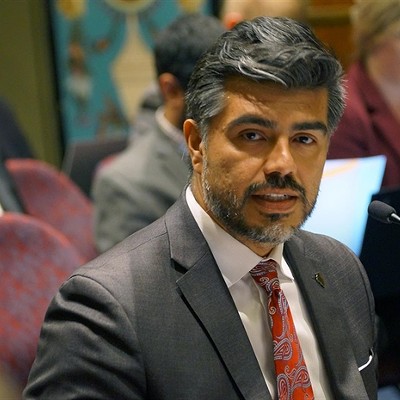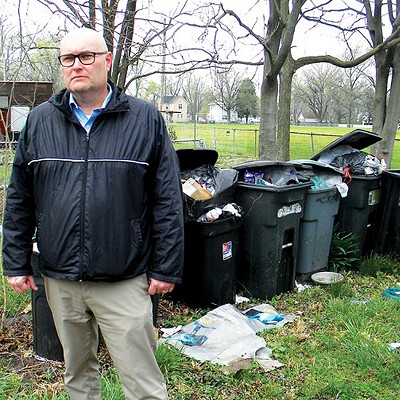Industrial-grade equipment that Ernestus Drake bought with a $20,000 grant from the city of Springfield helped his small business win new contracts, more than double its revenues and add employees.
Drake, 47, who was born and raised in Springfield, said the grant program for minority-owned businesses located in an impoverished area provided a needed jolt to put 4-year-old Drake Commercial Cleaning Inc. "over the hump."
"It was helping us get to that next level," he told Illinois Times.
But Merrill McDaniels is beyond frustrated with the program – funded with part of the city's sales tax on recreational-use marijuana sold by dispensaries in Springfield since cannabis sales and production became legal in Illinois in January 2020.
A member of the city's staff called a few months ago to say a $40,000 grant that would have helped L&M Gymnastics & Kids Inc. expand would be withdrawn, she said.
The reason given for the withdrawal, she said, was that the gymnastics school she and her husband, Leroy, have operated for 46 years – currently in rented space at 2717 S. 11th St. – hadn't yet moved into the part of Springfield's east side designated to benefit from the business grant program.

McDaniels said the staff never informed her of a deadline for moving there, and the couple were actively searching. The contract she signed with the city did contain a deadline, which has since passed, but she said she didn't realize there was a deadline until later.
"This was not handled properly or fairly," Merrill McDaniels said, adding there was a "total breakdown" of communication with city officials.
The experiences of two of the 22 businesses cumulatively awarded $631,704 from the city's Cannabis Business Grant program in 2022 reflect the inconsistencies that a recent audit indicated were rife after the program's first round of grants was awarded in June 2022.
Program paused
Mayor Misty Buscher, who defeated incumbent mayor Jim Langfelder in the April election, said she has paused the program, including a second round of grants, for at least several months while her administration fixes problems that caused the program to operate "haphazardly" under the Langfelder administration.
About $493,000 in cannabis sales tax revenue is available to distribute, and 16 applications for business grants were filed in the advertised sign-up period in May for the second round of the program, according to Val Yazell, Buscher's director of the Office of Planning and Economic Development.
Buscher said: "The cannabis program can continue, but it clearly needs to have proper oversight because it did not have proper oversight previously. And then I will change some of the internal controls and the requirements for documentation so that we don't have the problems that we had before."
The internal audit was conducted by the Springfield office of Sikich, a Naperville-based accounting firm, and commissioned by the Buscher administration after Yazell encountered "inconsistencies" in the program. It found that grant applications filled out by businesses "did not help clarify the confusion that hampered the program."
The fact that the cannabis grant application was also used to make awards to many of the businesses from property tax revenue in the Far East Tax Increment Financing District only complicated processing issues, the audit said. The boundaries of the TIF district and the Cannabis Occupation Tax Area aren't the same.
"These challenges weakened any internal controls intended to monitor the evaluation of applications, propriety of awards and verification of services funded with cannabis and TIF funds," according to the audit, a copy of which was obtained by Illinois Times.
The confusion, which reflected a lack of consistent rules and ongoing changes in how grants were administered, resulted in some businesses having to post money up-front for capital and equipment purchases while others were allowed to receive cash advances.
The way in which allocations are disbursed needs to be clarified to make the process fair, Yazell said.
The audit noted that the city initially told the public that nonprofit organizations wouldn't qualify for grants but reversed course later.
In addition, several businesses failed to submit invoices for all the work that was funded, according to the audit.
One business, Exotic Edible Pineapple Drinks LLC, apparently submitted two fraudulent requests for payment, the audit said.
The operators of Exotic Edible, which city records list as Angela Taylor and Cimmeria Taylor, didn't respond to a request for comment. They collected $3,500 of the $25,000 cannabis grant they were awarded and $3,500 of a potential $25,000 in TIF funds.
Exotic Edible Pineapple Drinks and Luxe Floral, which moved out of the Cannabis Occupation Tax Area despite being awarded a $25,000 grant and collecting all of it, were sent letters requesting repayment under the "claw back" provision of the program when violations occur, according to Corporation Counsel Gregory Moredock.
The city hasn't decided whether to take those businesses to court, he said, adding that the city has not referred any issues revealed by the audit to the Sangamon County State Attorney's Office for possible criminal prosecution.
Lisa Gaines, the owner of Luxe Floral, declined to comment on the record.
The audit's list of specific observations included B.O.N.E. LLC, a construction business owned by Calvin Pitts, which the audit said "received payment of $43,719 despite submitting one invoice for $5,345 for equipment repair."
Pitts didn't return a call seeking comment.
Haley & Associates, a consulting firm at 801 S. 11th St., "was paid far in excess of the amount of supporting invoices it submitted," according to the audit. The firm is owned by Teresa Haley, president of the Springfield NAACP and Illinois State Conference NAACP.
Haley didn't respond to requests for comment.
Buscher, the former city treasurer who took office in early May, said she was surprised at the number of findings in the 45-page audit.
"It's taxpayer money," she said. "Anyone can buy cannabis. ... All kinds of people are paying that tax. We need to be a good steward of our money."
Buscher said that the Office of Planning and Economic Development, which administered the program, was understaffed during the time period covered by the audit, and the office went without a director for more than a year between 2021 and 2022 after Langfelder fired Yazell in March 2021 without giving a reason. Those issues probably contributed to the program's problems, Buscher said.
Buscher rehired Yazell, who began as interim director in May and recently was affirmed by the City Council as the permanent director. Yazell said a "lack of staff and lack of trained staff contributed to the confusion."
Ravi Doshi, a business projects manager for the economic development office, was on "family leave" and unavailable to consult with grant applicants and recipients during a key period of the program's rollout. Doshi no longer works for the city and didn't return a call seeking comment.
Langfelder had a different reaction to the audit and disputed Buscher's assessment of the rollout of the program.
He told Illinois Times he wasn't surprised by the findings for the first year of a new program. The audit, he said, will be useful for putting improvements in place going forward.
The TIF funding, which must be used for infrastructure improvements, was added in the latter stage of planning for the program to provide more money to east side businesses, Langfelder said.
"It is a very complex program from a processing standpoint because there is no template to go on," Langfelder said. "This is the first one in the state, I believe, or maybe in the country."

"Room for improvement"
Langfelder said there's "room for improvement" in the program. He said the program should continue, and he cautioned city officials not to make the program too difficult for struggling businesses to navigate.
Buscher said the mistakes that were made weren't understandable, even in a program's first year. "Not in my opinion," she said with a chuckle. "I'm sure the previous administration would argue with me."
Among the audit's recommendations was a section that said the Office of Planning and Economic Development must have "sufficient staffing to review and evaluate grant applications, execute agreements, train grantees on acceptable practices, accept and review invoices, verify services, process and approve payments and perform necessary follow-up activity."
The audit suggested the city review the program's goals and establish a fraud hotline that allows anonymous reporting of suspected fraud and misappropriation of funds. The audit also called for the city to "establish a protocol for responding to whistleblower complaints."
Yazell said the audit "will help us to build a much better system for distributing the funds."
She said she was "saddened" by the findings, "just mostly for those recipients because there was not consistency. ... I really feel bad for the recipients. They only did what they were told."
When asked whether the business grant program will continue beyond the second round, Yazell would only say, "We are continuing to evaluate the value of this program."
"Focus on the intent of the program"
Langfelder said state lawmakers intended the economic benefits of marijuana legalization to benefit neighborhoods impacted by the "war on drugs" when marijuana was illegal.
"You may have your own opinions on that, but it's mainly for low-income areas, low-income individuals and minority populations," he said. "It is a program that's needed because the need is great, especially on the east side of Springfield. These are individuals that typically don't have the capital, and this provides that capital injection to improve job creation and business development in low-income areas of town."
The City Council decided to devote half of the city's 3% sales tax revenue from cannabis sales to help pay off the city's fire and police pension-related debt. The council is devoting the other half to economic development on the east side, most of it through the business grant program, and the remainder for an exterior home improvement grant program.
Homes and eligible minority-owned businesses must be in the Cannabis Occupation Tax Area, which is bounded by Carpenter Street on the north, Ash Street on the south, Dirksen Parkway on the east and the 10th Street rail corridor on the west, and the business owners must live in Springfield.
Though the audit didn't point out specific problems with the home improvement program, it said inadequate staffing in the economic development office contributed to a risk for fraud and mismanagement of funds.
Ward 2 Ald. Shawn Gregory said the audit made valid points for improving the business grant program. But he said the audit's contents should have been vetted by him and other city officials to correct some mistakes in the findings and provide more context before the document was sent to council members.
Gregory spearheaded creation of the business grant program with former Ward 3 alderwoman and current state Sen. Doris Turner, D-Springfield. The Cannabis Occupation Tax Area takes in parts of both wards.
"I think the audit was very, very one-sided," Gregory said. "And I think the audit has a lot of inconsistencies and misinformation and makes minority and Black businesses look like thieves and are not to be trusted with funding and this and that, when really that's not the truth."
For example, under the heading "specific observations," the audit said two entities – Motherland Gardens and Ollie Home Care Services – received awards despite having business locations outside the Cannabis Occupation Tax Area. The locations are within the area, though a cursory review of documents that listed the owners' home rather than business addresses could have led to confusion among auditors, Gregory said.
The audit said the city agreed to reimburse Ollie Home Care Services for property acquisition, "yet the company was actually reimbursed for training software and a subscription service." The company, which Illinois Secretary of State documents indicate is linked to Monte Turner, daughter of Doris Turner, didn't respond to a phone call and email seeking comment.
The audit noted that Boyd's New Generation, a restaurant at 1831 South Grand Ave. E., received more than $39,000 in cannabis grant funding after awards of $100,000 in TIF funding over the years 2019 and 2020.
But the fact that a business previously received TIF money didn't disqualify it from getting a cannabis or new TIF grant, Gregory said. Boyd's shouldn't have been mentioned in the audit, because including the business among Sikich's list of observations made the grant appear suspicious, he said.
The audit said it appears some vendors were paid "after local politicians intervened and questioned why payments were not made, or requested that recipients be paid in advance."
It's unclear which politicians the auditors were referring to. Gregory said he advocated at public meetings on behalf of businesses waiting on their grants but did nothing illegal.
Gregory didn't take issue with some observations in the audit and said he didn't have enough information to comment on all the details cited.
The audit recommended the city establish scoring criteria and "seek to eliminate outside influence into awards and payments." But Gregory said such a scoring system was used and developed with the assistance of the micro-lending company Justine Petersen.
Some of the grant recipients were political supporters of Langfelder, but the former mayor denied exerting any influence to favor them. The scoring system also insulated the process from bias, he said.
Gregory said he favors improvements in the program, and he wants rules clarified so the city is allowed to continue to pay businesses or vendors directly – before work is performed – because many businesses lack cash flow to pay vendors up front and be reimbursed later.
"I want to make sure that we keep the focus on the intent of the program – that we are dealing with people who don't have a lot of money," Gregory said. "I think, as a city, we have to find unique and innovative ways to help the poorest communities."
Ward 3 Ald. Roy Williams said the audit portrayed some businesses and city staff members unfairly.
"No one was doing anything illegal," he said. "I think it's learning pains. The audit is not about pointing fingers."
Critics of Langfelder are trying to use the audit to make his administration look inept and corrupt, "but that's not fair," Williams said. "This was a new program."
Merrill McDaniels, the gymnastics school owner, said she wants the city to reconsider withdrawal of the $40,000 cannabis grant and $40,000 in TIF funds.
"We've done nothing but give to the future generations," she said, noting that future Springfield doctors, lawyers and a judge were among the hundreds of young people who have gone through gymnastics instruction at L&M.
"You just don't treat people like this," McDaniels said. "It's more of a slap in the face. ... when people treat you like you don't matter."
Ernestus Drake, on the other hand, continues to appreciate the cannabis award and $20,000 in TIF funding to Drake Commercial Cleaning that allowed the business, at 600 S. 11th St., to replace part of its roof, repaint the building and make other site improvements.
Drake said he would have preferred some up-front funding because coming up with cash to buy equipment and then being reimbursed by the city slowed him down in acquiring all the equipment he needed.
But he said the cannabis grant eventually "enabled us to take on more bids. The program definitely helped our business grow."





















